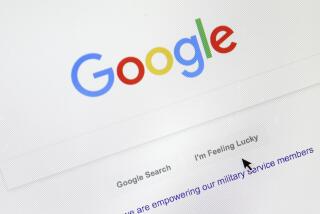Newspapers want to team up against the ‘inexorable threat’ from Google and Facebook. Will the government let them?
For years, news organizations have had little recourse but to cede more distribution and advertising dollars to Facebook and Google, even agreeing to give away articles in the hopes the wider digital audience will pay off in the long run.
But as profits continue to decline in journalism, news media executives have decided time is running out to make a change.
An industry trade group called the News Media Alliance — which counts the Los Angeles’ Times parent company Tronc, the New York Times, the Wall Street Journal and scores of smaller newspapers among its members — is calling on federal lawmakers to grant the industry an exemption from antitrust rules to negotiate collectively with the technology giants.
By banding together, news outlets would have more leverage against two companies that command more than 70% of the $73-billion digital advertising industry in the U.S. By comparison, newspaper ad revenue in 2016 amounted to $18 billion, down from $50 billion a decade ago, according to the Pew Research Center.
The message from the News Media Alliance is simple: Good reporting is time-consuming and expensive — and more important than ever at a time when the Internet is awash with questionable news, opinion and hoaxes.
Facebook and Google “don’t employ reporters: They don’t dig through public records to uncover corruption, send correspondents into war zones, or attend last night’s game to get the highlights. They expect an economically squeezed news industry to do that costly work for them,” David Chavern, president and chief executive of the News Media Alliance, wrote in an opinion piece published Sunday in the Wall Street Journal.
“The only way publishers can address this inexorable threat is by banding together,” Chavern wrote. “If they open a unified front to negotiate with Google and Facebook — pushing for stronger intellectual-property protections, better support for subscription models and a fair share of revenue and data — they could build a more sustainable future for the news business.”
Facebook and the News Media Alliance didn’t respond Sunday afternoon to requests to comment. Google said in a statement it wanted to help publishers transition to digital.
“We remain deeply committed to helping publishers with both their challenges, and their opportunities,” the search giant said.
It’s unclear how difficult it would be for the alliance to circumvent antitrust rules that were designed to prevent companies from becoming over-dominant — something newspapers haven’t been accused of in decades.
Regulators, Chavern argued, haven’t been particularly strict with Facebook, which recently saw the number of its monthly users soar to 2 billion worldwide, and Google, which accounts for upwards of 80% of Internet searches. They allowed Google to vault to the top of the online ad market by approving the acquisitions of ad exchanges Doubleclick, AdMob and AdMeld. Facebook was also permitted to purchase two major competitors, Instagram and WhatsApp.
Newspapers may control an outsized level of influence in public discourse, but their financial prowess is puny compared with Google and Facebook, which enjoy market capitalizations of $649 billion and $434 billion, respectively. News Corp., which owns the Wall Street Journal and the New York Post, stands at $7.55 billion, the New York Times Co. at $2.78 billion and Tronc at $409 million.
“The unique role news media continue to play in American politics and history makes it crucial to ensure a fairer fight for revenue between news publishers and these massive information gateways,” Chavern said. “Today, antitrust laws are insulating Google and Facebook from market forces. News publishers are committed to unleashing those forces to defend their investments in great journalism.”
Times staff writer Paresh Dave contributed to this article.
Follow me @dhpierson on Twitter
ALSO
Facebook reaches 2 billion users







